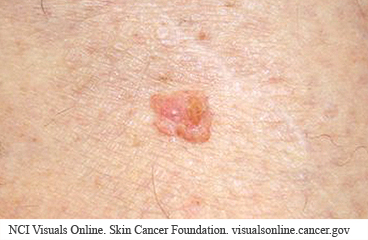
Overview
Squamous cell skin cancer (also called squamous cell carcinoma of the skin) is a common type of skin cancer. It can occur on any part of the skin. This includes the head, neck, trunk, arms, hands, and legs. It also includes inside the mouth, on the genitals, and on the skin near the anus.
It's more common in people with lighter skin. In these people, it most often appears on parts of the body exposed to the sun. In people with darker skin, it appears more often on skin that isn't exposed to the sun and in areas where there are scars or ongoing skin problems.
Skin cancer is usually treated with surgery. When found and treated early, most of these cancers can be cured. If not treated, this skin cancer may grow and spread (metastasize).
This skin cancer is often caused by too much sun. Using tanning beds or sunlamps can also cause it.
What are the symptoms?
Squamous cell skin cancer often affects the head, neck, trunk, arms, and legs. But it can be anywhere on the body where there is skin. This includes inside the mouth, on the genitals, and near the anus.
Signs of squamous cell skin cancer include:
- Any firm bump that doesn't go away. It is often on sun-exposed skin. But it can be on any part of the body.
- Any patch of skin that feels scaly, bleeds, or develops a crust. The patch may get bigger over a period of months and form a sore.
- Any skin growth that looks like a wart.
- Any sore that does not heal. It may occur in a scar or on skin that has ongoing problems.
- Any area of thickened skin on the lower lip. This is more likely if you smoke or use chewing tobacco, or your lips are often exposed to the sun and wind.
How is it treated?
Your doctor will want to remove all of the cancer. There are several ways to remove it. It depends on how big it is, where it is on your body, and your age and overall health. Options include:
- Surgery. The doctor numbs the skin and cuts out the cancer. This almost always cures the cancer.
- Mohs micrographic surgery. The doctor removes the skin cancer one layer at a time, checking each layer for cancer cells right after it is removed.
- Curettage and electrosurgery. Curettage uses a spoon-shaped tool (curette) to scrape off the skin cancer. Electrosurgery controls the bleeding.
- Cryosurgery. This destroys the cancer by freezing it.
- Photodynamic therapy. This uses a medicine that is activated with light.
Radiation therapy may be done if surgery isn't an option. Other treatment options include medicine applied to the skin (topical therapy). Treatment for advanced cases may include immunotherapy and chemotherapy.
After treatment, you'll need regular checkups.
How can you lower your risk?
- Always wear a wide-brimmed hat and long sleeves and pants if you are going to be outdoors.
- Avoid the sun between 10 a.m. and 4 p.m., which is the peak time for UV rays. If outdoors, seek the shade.
- Always wear sunscreen on exposed skin. This is important for people of all skin colors. Make sure to use a broad-spectrum sunscreen that has a sun protection factor (SPF) of 30 or higher. Use it every day, even when it is cloudy.
- Use lip balm or cream that has sun SPF to protect your lips from getting sunburned.
- Wear sunglasses that block UV rays.
- Do not use tanning booths or sunlamps.
- Don't smoke or use tobacco products. If you need help quitting, talk to your doctor about stop-smoking programs and medicines. These can increase your chances of quitting for good.
When should you call for help?
Watch closely for changes in your health, and be sure to contact your doctor if:
- You see a change in your skin, such as a spot, growth, or mole that:
- Grows bigger. This may happen slowly.
- Changes color.
- Changes shape.
- Starts to bleed easily or develops a crust.
- You have a wound that does not heal.
Follow-up care is a key part of your treatment and safety. Be sure to make and go to all appointments, and call your doctor if you are having problems. It's also a good idea to know your test results and keep a list of the medicines you take.
Where can you learn more?
Go to http://www.healthwise.net/patientEd
Enter U290 in the search box to learn more about "Learning About Squamous Cell Skin Cancer".
Current as of: October 25, 2024
Author: Ignite Healthwise, LLC Staff
Clinical Review Board
All Ignite Healthwise, LLC education is reviewed by a team that includes physicians, nurses, advanced practitioners, registered dieticians, and other healthcare professionals.

